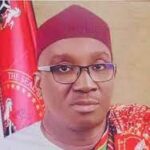Every now and then, an important item in the news tends to remind me of something.
When Vice President Yemi Osinbajo said last Tuesday that this country should try new tactics in the fight against corruption, he reminded me of Nasiru Imam, Deputy Managing Editor of Daily Trust and long-time secretary of its Editorial Board.
Some years ago, the editorial board was discussing the problem of teachers’ salaries, which were in arrears in many states.
One member said the system of paying teachers through State Basic Education Commissions [SBECs] is failing.
Another member, however, said funds for paying teachers’ salaries were once paid directly to local governments.
The system was ended because many LGAs diverted them.
Yet, another member pointed out that in the 1980s – early 1990s, Babangida regime had centralised the payment of teachers’ salaries in the National Primary Education Commission [NPEC] but that arrangement also ran into problems.
Nasiru Imam dropped his pen, sighed and said, “Every method has been tried. Nothing worked.”
Osinbajo spoke at an Independent Corrupt Practices and Other Related Offences Commission [ICPC] regional webinar on “Combatting Corruption and Illicit Financial Flows: New Measures and Strategies.”
He said we must democratise the fight against corruption and protect whistle blowers. Very good!
He is looking for another method to fight corruption.
In the last 60 years in Nigeria, which tactic have we not tried in fighting corruption?
We have overthrown governments because of corruption. Those who overthrew the First Republic in January 1966; those who overthrew the Gowon regime in 1975; those who killed General Murtala Mohammed in 1976; those who overthrew the Second Republic in 1983 as well as those who voted out the Jonathan Administration in 2015, all alleged that it was due to corruption.
We later realised that Sardauna, Balewa, Gowon, Murtala and Shagari had no money.
We tried affidavits.
In 1974, Godwin Daboh filed an affidavit against Federal Commissioner for Communications, Joseph Tarka, while Aper Aku filed another affidavit in court against Benue Plateau State Military Governor, Police Commissioner Joseph Gomwalk, both alleging corruption.
We tried a purge. In 1975-76, Murtala purged thousands of public servants in all sectors.
He used the harshest words and the sternest language including summary dismissal, dead woods, with ignominy, with immediate effect, betrayed the ethics of their professions, and they should be ashamed of themselves.
We tried Public Complaints Commission, which Murtala formed in 1976 with the hyper-active Yusuf Maitama Sule as its first Federal Commissioner.
When that did not work, we tried exhortation. In 1977, Head of State, General Obasanjo, went to Jaji and made the Jaji Declaration, that Nigeria must create a society that is fair, just, humane and African. It failed.
In 1981, President Shehu Shagari tried an Ethical Revolution.
It hardly got off the ground, so in 1983, he created an Egypt-style Ministry of National Guidance with Yusuf Maitama Sule as the minister.
It made no impact either, so in 1984-85, we tried a War Against Indiscipline, WAI. Buhari/Idiagbon regime launched it in five brutal phases, complete with a WAI Brigade that became notorious for its excesses.
General Buhari also signed the Recovery of Public Property [Special Military Tribunals] Decree no 3 of 1984.
The Special Military Investigation Panels turned the doctrine of justice on its head.
They said based on a former public office holder’s declaration of assets, he was presumed guilty until he could prove his innocence.
Those who couldn’t do so were turned over to Special Military Tribunals, which jailed dozens of former governors, ministers and other top officials, some for up to 300 years.
Many governors were jailed for donating public funds to their political parties.
We tried court cases. Gani Fawehinmi filed an innumerable number of suits to challenge every suspected corrupt act by the Babangida regime, including Mrs. Babangida’s pet Better Life for Rural Women.
We tried Failed Banks Tribunals. General Sani Abacha created them with much fanfare.
They jailed many bankers and bank debtors, even though Abacha himself nearly bankrupted the Central Bank.
Under General Abdulsalami Abubakar, we began efforts to retrieve looted assets. Recovering the Abacha loot has been on for 22 years now.
In 1999, President Obasanjo promised in his inaugural address to fight corruption.
Five years later, he created EFCC and ICPC. Later, EFCC created NFIU, which is now an independent body.
We even tried an Anti-corruption Advisory, which EFCC issued just before the 2007 elections.
We tried a Freedom of Information Act but, unlike in America, government agencies here routinely ignore FOI requests.
Obasanjo also did a Servicom, with units in every ministry and agency but that did not dent corruption.
A lot of human rights and anti-corruption NGOs also sprang up in Nigeria, mostly populated by left-wingers who were left ideologically stranded by the East Bloc’s collapse in 1989.
Newspaper editors, reporters and columnists have also done what they can in the war against corruption.
Nearly every day in the last 50 years, exposes of corrupt deeds are the lead stories in many Nigerian newspapers.
No one can count the feature articles, opinion columns and editorials written against corruption.
In recent years, the social media joined in the fight, not always appropriately.
Nigeria Police too has done its best; arrested and charged to court thousands of people for acts of corruption, even if they were less than one-tenth of the culprits.
Ditto for the courts; they have jailed thousands of people for corruption in the last 60 years, after ponderous trials and appeals, but let many thieves off the hook.
In 2007, President Umaru Yar’adua tried adherence to rule of law as an anti-corruption strategy.
That did not work either.
President Jonathan’s biggest contribution to the anti-corruption war was to make a distinction between ordinary stealing and corruption, which he later said he heard from the Chief Justice.
We tried whistleblowing but the blowers were left unpaid. In the last 10 years, we deployed technological tools including BVN, TSA and EFCC’s Eagleclaw against corruption.
They made a dent, but not all that much.
President Buhari’s anti-corruption campaign, launched in 2015, at first held the highest promise but it had no blueprint and totally relied on EFCC. It recently came crashing down in flames.
Even the force of personal example did not help.
You can’t have a simpler national leader than Prime Minister Abubakar Tafawa Balewa.
That iconic 1965 photo of him, on leave in Bauchi, taken by a white journalist, sitting on a local mat, his two children around him, eating sugar cane, no sign of security guards or limos, no mansion behind him, no exquisite furniture, no Persian rugs, no contract files in sight and no fawning aides nearby.
Yet he was killed by totally misguided soldiers for alleged corruption.
Sardauna Ahmadu Bello, after being overwhelming Premier of the North for 12 years, governing 20 of today’s 37 states including FCT, had only one personal car, a Pontiac, when he was killed in the January 1966 coup.
When I interviewed his personal driver, Nuhu Direba, in Sokoto in January 1991, he told me that two days after the coup, he evacuated Sardauna’s family to Sokoto in that lone car.
It was too small to accommodate their bags, so Sardauna’s Principal Private Secretary, Hassan Lemu, went and borrowed another car.
The family left for Sokoto in that two-vehicle convoy.
Sardauna had no house in Kaduna that his family could relocate to.
Even though under his rule, Ministry of Lands carved out hundreds of GRA plots and allocated them to senior civil servants and merchants, Sardauna got none.
In Sokoto too, he had only one modest house even though before he became Premier in 1954, he was the Northern Region Minister of Works, Community Development and Local Governments, in charge of all Emirs, Chiefs and Native Authorities.
Before that, he was Councillor in charge of Sokoto NA’s Central Office, i.e. SSG of today’s Sokoto and Zamfara States combined.
Which personal example again is anyone talking about?
I wish Prof Osinbajo luck in his search for a new tactic.
I can’t think of any that has not been tried already.

 Join Daily Trust WhatsApp Community For Quick Access To News and Happenings Around You.
Join Daily Trust WhatsApp Community For Quick Access To News and Happenings Around You.


